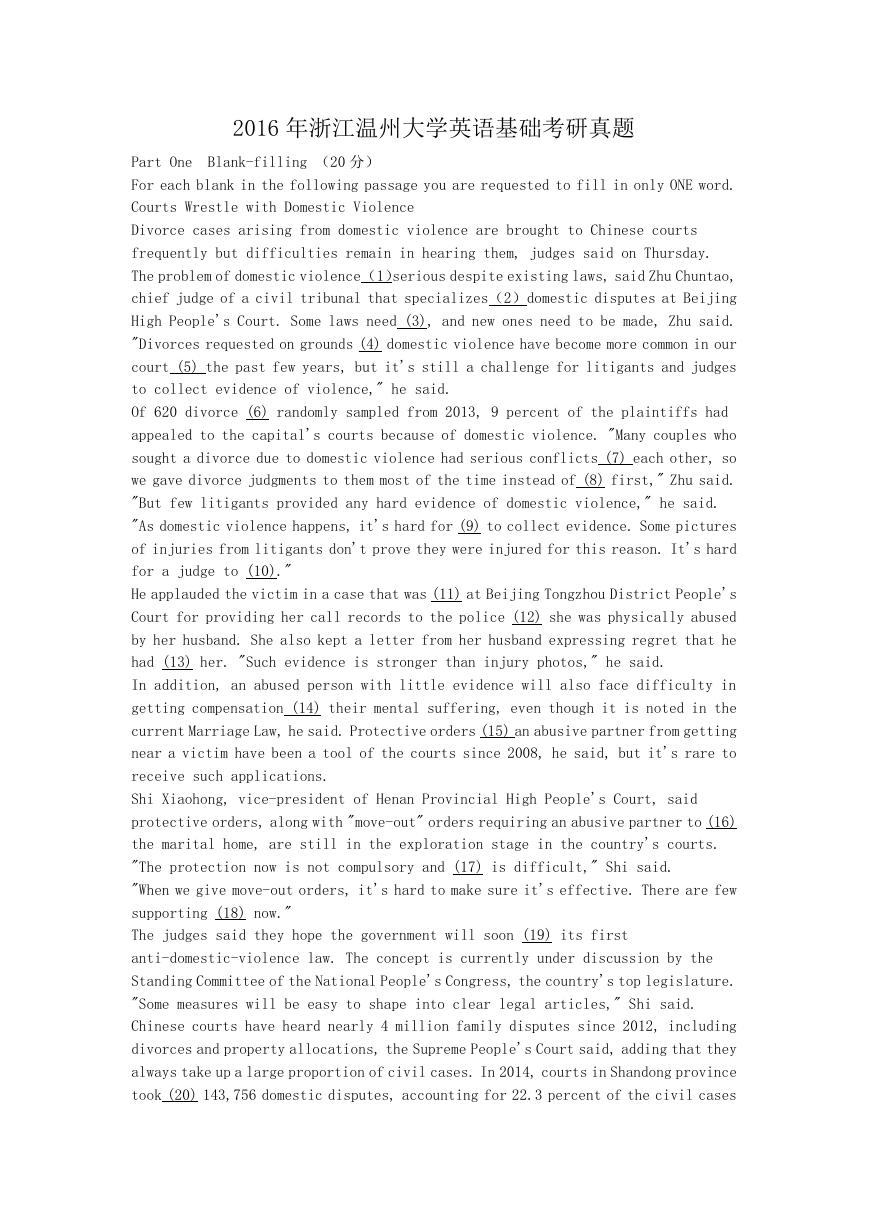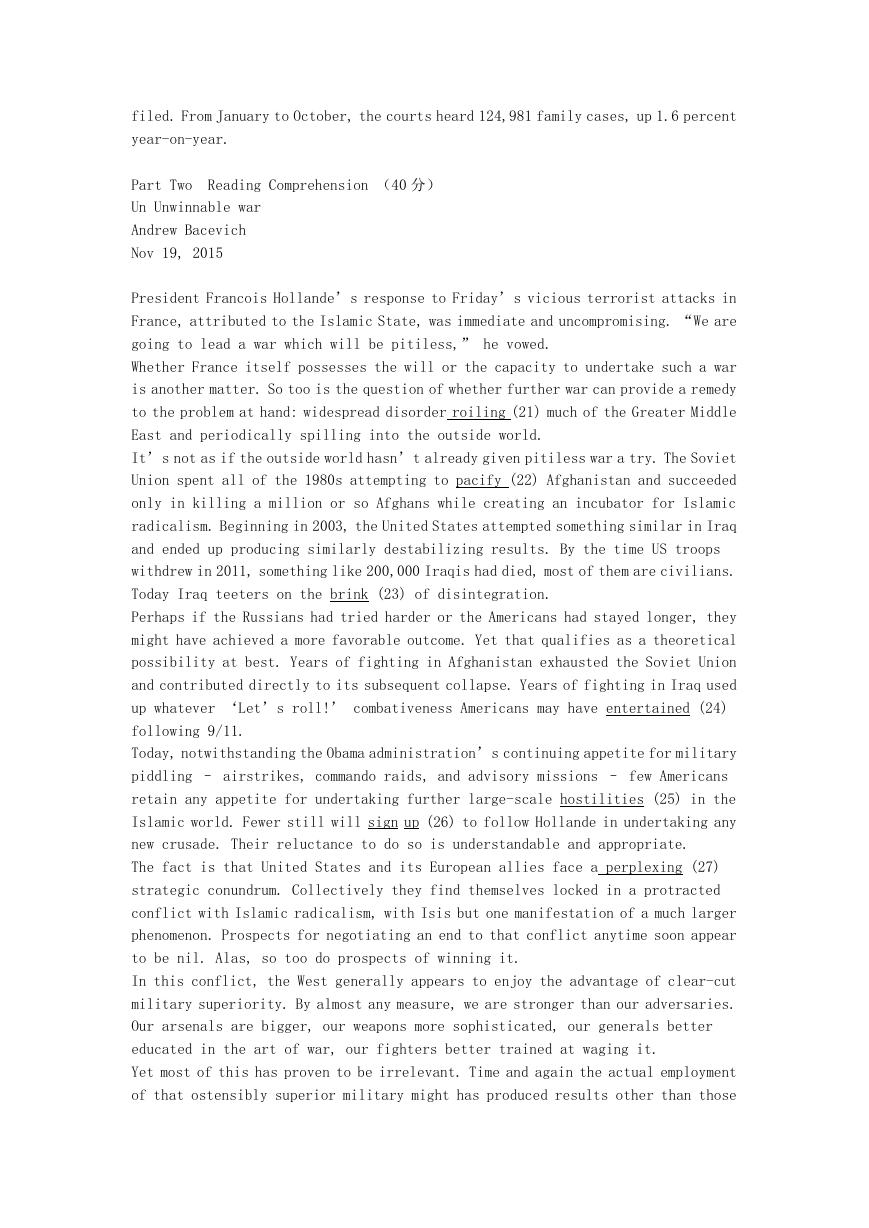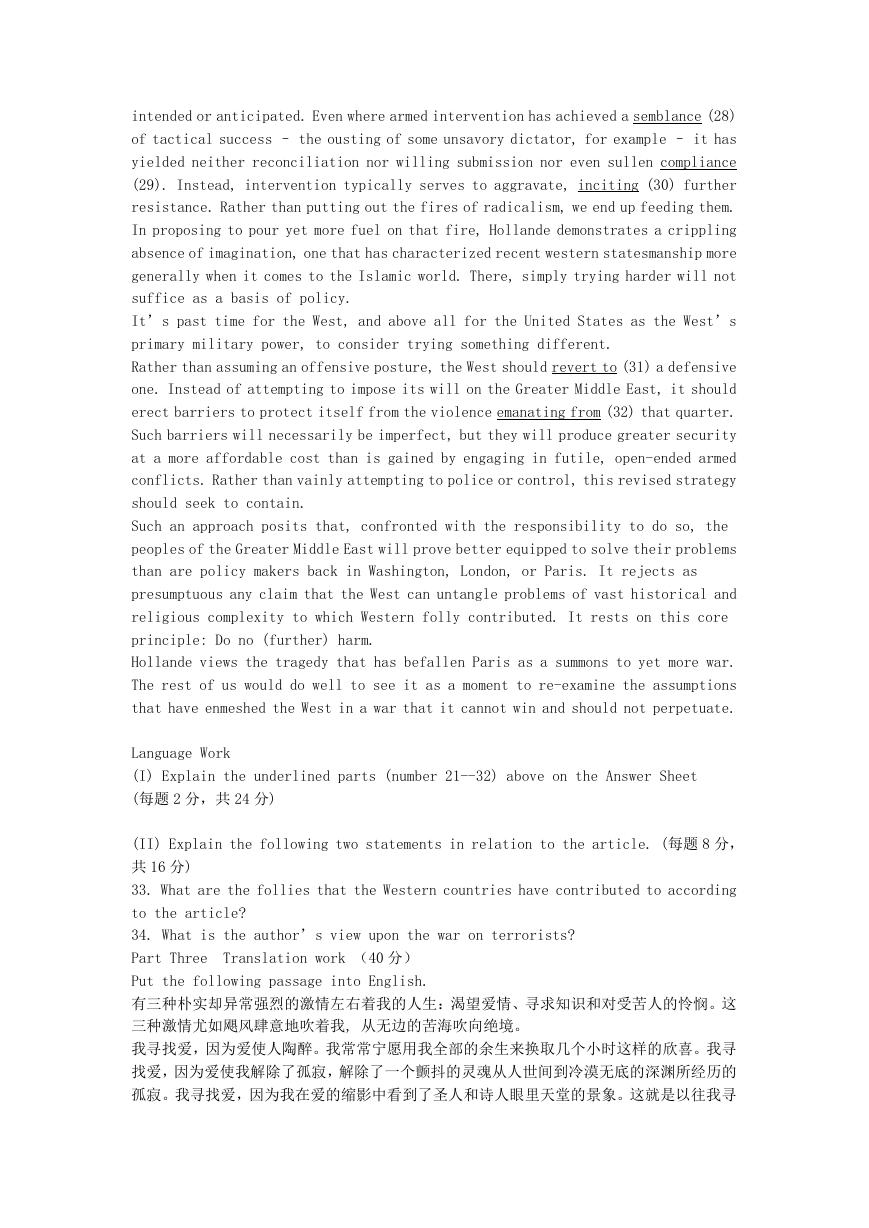2016 年浙江温州大学英语基础考研真题
Part One Blank-filling (20 分)
For each blank in the following passage you are requested to fill in only ONE word.
Courts Wrestle with Domestic Violence
Divorce cases arising from domestic violence are brought to Chinese courts
frequently but difficulties remain in hearing them, judges said on Thursday.
The problem of domestic violence(1)serious despite existing laws, said Zhu Chuntao,
chief judge of a civil tribunal that specializes(2)domestic disputes at Beijing
High People's Court. Some laws need (3), and new ones need to be made, Zhu said.
"Divorces requested on grounds (4) domestic violence have become more common in our
court (5) the past few years, but it's still a challenge for litigants and judges
to collect evidence of violence," he said.
Of 620 divorce (6) randomly sampled from 2013, 9 percent of the plaintiffs had
appealed to the capital's courts because of domestic violence. "Many couples who
sought a divorce due to domestic violence had serious conflicts (7) each other, so
we gave divorce judgments to them most of the time instead of (8) first," Zhu said.
"But few litigants provided any hard evidence of domestic violence," he said.
"As domestic violence happens, it's hard for (9) to collect evidence. Some pictures
of injuries from litigants don't prove they were injured for this reason. It's hard
for a judge to (10)."
He applauded the victim in a case that was (11) at Beijing Tongzhou District People's
Court for providing her call records to the police (12) she was physically abused
by her husband. She also kept a letter from her husband expressing regret that he
had (13) her. "Such evidence is stronger than injury photos," he said.
In addition, an abused person with little evidence will also face difficulty in
getting compensation (14) their mental suffering, even though it is noted in the
current Marriage Law, he said. Protective orders (15) an abusive partner from getting
near a victim have been a tool of the courts since 2008, he said, but it's rare to
receive such applications.
Shi Xiaohong, vice-president of Henan Provincial High People's Court, said
protective orders, along with "move-out" orders requiring an abusive partner to (16)
the marital home, are still in the exploration stage in the country's courts.
"The protection now is not compulsory and (17) is difficult," Shi said.
"When we give move-out orders, it's hard to make sure it's effective. There are few
supporting (18) now."
The judges said they hope the government will soon (19) its first
anti-domestic-violence law. The concept is currently under discussion by the
Standing Committee of the National People's Congress, the country's top legislature.
"Some measures will be easy to shape into clear legal articles," Shi said.
Chinese courts have heard nearly 4 million family disputes since 2012, including
divorces and property allocations, the Supreme People's Court said, adding that they
always take up a large proportion of civil cases. In 2014, courts in Shandong province
took (20) 143,756 domestic disputes, accounting for 22.3 percent of the civil cases
�
filed. From January to October, the courts heard 124,981 family cases, up 1.6 percent
year-on-year.
Part Two Reading Comprehension (40 分)
Un Unwinnable war
Andrew Bacevich
Nov 19, 2015
President Francois Hollande’s response to Friday’s vicious terrorist attacks in
France, attributed to the Islamic State, was immediate and uncompromising. “We are
going to lead a war which will be pitiless,” he vowed.
Whether France itself possesses the will or the capacity to undertake such a war
is another matter. So too is the question of whether further war can provide a remedy
to the problem at hand: widespread disorder roiling (21) much of the Greater Middle
East and periodically spilling into the outside world.
It’s not as if the outside world hasn’t already given pitiless war a try. The Soviet
Union spent all of the 1980s attempting to pacify (22) Afghanistan and succeeded
only in killing a million or so Afghans while creating an incubator for Islamic
radicalism. Beginning in 2003, the United States attempted something similar in Iraq
and ended up producing similarly destabilizing results. By the time US troops
withdrew in 2011, something like 200,000 Iraqis had died, most of them are civilians.
Today Iraq teeters on the brink (23) of disintegration.
Perhaps if the Russians had tried harder or the Americans had stayed longer, they
might have achieved a more favorable outcome. Yet that qualifies as a theoretical
possibility at best. Years of fighting in Afghanistan exhausted the Soviet Union
and contributed directly to its subsequent collapse. Years of fighting in Iraq used
up whatever ‘Let’s roll!’ combativeness Americans may have entertained (24)
following 9/11.
Today, notwithstanding the Obama administration’s continuing appetite for military
piddling – airstrikes, commando raids, and advisory missions – few Americans
retain any appetite for undertaking further large-scale hostilities (25) in the
Islamic world. Fewer still will sign up (26) to follow Hollande in undertaking any
new crusade. Their reluctance to do so is understandable and appropriate.
The fact is that United States and its European allies face a perplexing (27)
strategic conundrum. Collectively they find themselves locked in a protracted
conflict with Islamic radicalism, with Isis but one manifestation of a much larger
phenomenon. Prospects for negotiating an end to that conflict anytime soon appear
to be nil. Alas, so too do prospects of winning it.
In this conflict, the West generally appears to enjoy the advantage of clear-cut
military superiority. By almost any measure, we are stronger than our adversaries.
Our arsenals are bigger, our weapons more sophisticated, our generals better
educated in the art of war, our fighters better trained at waging it.
Yet most of this has proven to be irrelevant. Time and again the actual employment
of that ostensibly superior military might has produced results other than those
�
intended or anticipated. Even where armed intervention has achieved a semblance (28)
of tactical success – the ousting of some unsavory dictator, for example – it has
yielded neither reconciliation nor willing submission nor even sullen compliance
(29). Instead, intervention typically serves to aggravate, inciting (30) further
resistance. Rather than putting out the fires of radicalism, we end up feeding them.
In proposing to pour yet more fuel on that fire, Hollande demonstrates a crippling
absence of imagination, one that has characterized recent western statesmanship more
generally when it comes to the Islamic world. There, simply trying harder will not
suffice as a basis of policy.
It’s past time for the West, and above all for the United States as the West’s
primary military power, to consider trying something different.
Rather than assuming an offensive posture, the West should revert to (31) a defensive
one. Instead of attempting to impose its will on the Greater Middle East, it should
erect barriers to protect itself from the violence emanating from (32) that quarter.
Such barriers will necessarily be imperfect, but they will produce greater security
at a more affordable cost than is gained by engaging in futile, open-ended armed
conflicts. Rather than vainly attempting to police or control, this revised strategy
should seek to contain.
Such an approach posits that, confronted with the responsibility to do so, the
peoples of the Greater Middle East will prove better equipped to solve their problems
than are policy makers back in Washington, London, or Paris. It rejects as
presumptuous any claim that the West can untangle problems of vast historical and
religious complexity to which Western folly contributed. It rests on this core
principle: Do no (further) harm.
Hollande views the tragedy that has befallen Paris as a summons to yet more war.
The rest of us would do well to see it as a moment to re-examine the assumptions
that have enmeshed the West in a war that it cannot win and should not perpetuate.
Language Work
(I) Explain the underlined parts (number 21--32) above on the Answer Sheet
(每题 2 分,共 24 分)
(II) Explain the following two statements in relation to the article. (每题 8 分,
共 16 分)
33. What are the follies that the Western countries have contributed to according
to the article?
34. What is the author’s view upon the war on terrorists?
Part Three
Put the following passage into English.
有三种朴实却异常强烈的激情左右着我的人生:渴望爱情、寻求知识和对受苦人的怜悯。这
三种激情尤如飓风肆意地吹着我, 从无边的苦海吹向绝境。
我寻找爱,因为爱使人陶醉。我常常宁愿用我全部的余生来换取几个小时这样的欣喜。我寻
找爱,因为爱使我解除了孤寂,解除了一个颤抖的灵魂从人世间到冷漠无底的深渊所经历的
孤寂。我寻找爱,因为我在爱的缩影中看到了圣人和诗人眼里天堂的景象。这就是以往我寻
Translation work (40 分)
�
找的,虽然对于人生来说似乎过于美好,但我终于找到了。
以同样的激情,我寻求知识。我渴望理解人类的心灵。我想知道群星为何闪烁。我试图领悟
毕达哥拉斯的数的魔力,它支配着数的和谐。我已多少达到了此目的。
Essay-writing (50 分)
Part Four
Topic: Do you like cartoon? Is it childish?Why or why not?
Word limit: 500-600
(Please write your essay on the Answer Sheet)
�








 2023年江西萍乡中考道德与法治真题及答案.doc
2023年江西萍乡中考道德与法治真题及答案.doc 2012年重庆南川中考生物真题及答案.doc
2012年重庆南川中考生物真题及答案.doc 2013年江西师范大学地理学综合及文艺理论基础考研真题.doc
2013年江西师范大学地理学综合及文艺理论基础考研真题.doc 2020年四川甘孜小升初语文真题及答案I卷.doc
2020年四川甘孜小升初语文真题及答案I卷.doc 2020年注册岩土工程师专业基础考试真题及答案.doc
2020年注册岩土工程师专业基础考试真题及答案.doc 2023-2024学年福建省厦门市九年级上学期数学月考试题及答案.doc
2023-2024学年福建省厦门市九年级上学期数学月考试题及答案.doc 2021-2022学年辽宁省沈阳市大东区九年级上学期语文期末试题及答案.doc
2021-2022学年辽宁省沈阳市大东区九年级上学期语文期末试题及答案.doc 2022-2023学年北京东城区初三第一学期物理期末试卷及答案.doc
2022-2023学年北京东城区初三第一学期物理期末试卷及答案.doc 2018上半年江西教师资格初中地理学科知识与教学能力真题及答案.doc
2018上半年江西教师资格初中地理学科知识与教学能力真题及答案.doc 2012年河北国家公务员申论考试真题及答案-省级.doc
2012年河北国家公务员申论考试真题及答案-省级.doc 2020-2021学年江苏省扬州市江都区邵樊片九年级上学期数学第一次质量检测试题及答案.doc
2020-2021学年江苏省扬州市江都区邵樊片九年级上学期数学第一次质量检测试题及答案.doc 2022下半年黑龙江教师资格证中学综合素质真题及答案.doc
2022下半年黑龙江教师资格证中学综合素质真题及答案.doc